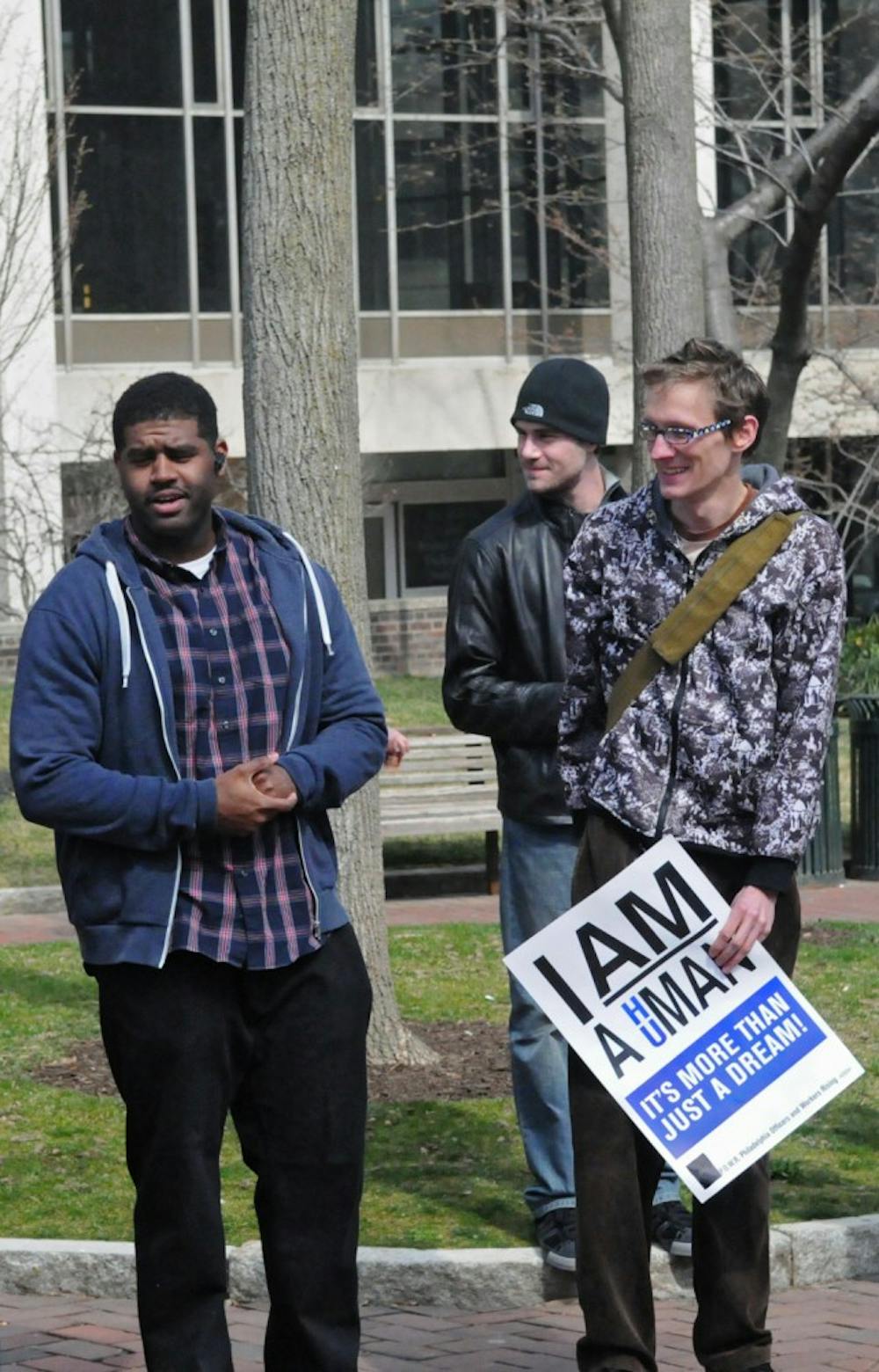Penn AlliedBarton security officers gathered at the Button yesterday afternoon to garner support for their intent to unionize.
The workers complained of poor working conditions, carried “I am a human” signs and handed out fliers that read, “We love our jobs, but conditions can be better.” They denounced what they view as unfair promotions and demanded improved health insurance, more sick days and more vacation times.
All PennWalk officers and officers who patrol Penn Park, who are employed by AlliedBarton, will vote on April 11 on whether they want to be a part of the Philadelphia Security Officers Union, an independent union for security guards in the area.
AlliedBarton officers from Penn approached PSOU last February for help on how to unionize and better understand their rights. They raised awareness for their intent to unionize at the National Day of Action for Education rally on March 1.
The officers seeking unionization are under the management of AlliedBarton Security Services, a national security company Penn contracts with. The company has about 55,000 employees.
Penn Police officers, however, are employed at the University.
In an emailed statement, AlliedBarton said it “supports its officers’ right to choose to be represented by a labor union” and that it “strives to provide the best wages, benefits and training for all of [its] employees.”
However, officers claim they have been mistreated as employees.
Related
Guards lead charge for more sick days
New benefits for local AlliedBarton guards
“We seek conversation,” AlliedBarton patrol officer and part-time supervisor Joshua Hupp said at the rally.
Hupp, who has been with the company for over a year, said he and his colleagues are lobbying for salary increases and more sick days. He also questions the company’s promotion practices.
David Scott, who has been a PennWalk patrol officer for five years, cited many examples of problems he has with his employer.
“We get these orders barked down to us. We want to have the respect of having a conversation,” he said. “That’s the biggest thing the union will do for us. It would give us a voice.”
He added that he wants AlliedBarton to offer better health insurance and benefits.
“They expect us to go out and help everyone with a big smile on our faces,” Scott said. “It makes it really hard to get up and go to work everyday.”
Scott also has complaints about rules regarding bathroom breaks while on duty.
“We do the bulk of the jobs here — jump-starts, lockouts, finding missing people — but get no praise,” Scott said.
About 20 students and faculty members joined the officers at the Button.
Though AlliedBarton security officers aren’t employed by the University, some believe Penn should aid the officers in their cause.
“Penn plays a role in it,” PSOU organizer Fabricio Rodriguez said. “What we’ve been able to prove over the years at Penn is that at the end of the day, the client — UPenn — has a say in how people are treated on campus.”
In 2008, Penn intervened, resulting in a wage raise from $9.70 to $15 an hour for roving security guards.
However, when asked about the current situation, Vice President for Public Safety Maureen Rush said “we do not get involved in any personnel or unionization issues.”
In 2005, five officers were suspended after handing Penn President Amy Gutmann a petition asking for improved working conditions.
“Workers and security guards are part of the community at Penn, so for them to be able to speak as a group is crucial,” said Wharton senior Russell Trimmer, a member of the Student Labor Action Project — a student labor rights group on campus. “There’s definitely a fuzzy line between what is University and what is not. Penn has a responsibility to help make an impact.”
College junior and SLAP coordinator Meghna Chandra said, “Just from a moral ethical standpoint, we definitely need to do something about it.”
Another union, Service Employee International Union, is trying to represent the Penn AlliedBarton officers, but the officers are resisting its efforts.
Corey Dowdle, an officer for three years now, said that after the 2005 agreement between AlliedBarton and SEIU, SEIU agreed to stay out of Philadelphia.
Hupp explained that National Labor Relations Board rule stipulates that SEIU cannot represent them. He questions SEIU’s intentions and believes that if they represented them, it would “slow us down.”
This article was revised to reflect that a vote among AlliedBarton security officers on whether they want to be part of the Philadelphia Security Officers Union will take place April 11, not April 12.



